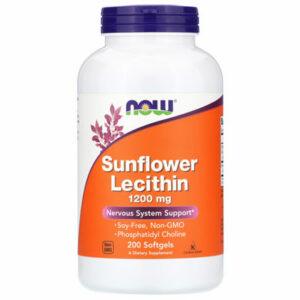Lecithin is a common dietary supplement that is often claimed to have cholesterol-lowering and unclogging mammary duct obstruction and is helpful for cognitive function and liver health.
Do you know the benefits of lecithin supplements? Is lecithin really work? Is there any side effect? For more details, see the article below.
Table of Contents
- What is lecithin?
- What are the benefits of lecithin?
- 1. Lecithin is beneficial for dementia and cognitive dysfunction
- 2. Lecithin is beneficial for the development of mental related diseases
- 3. Lecithin benefits hypercholesterolemia
- 4. Lecithin relieves menopausal symptoms
- 5. Lecithin benefits ulcerative colitis
- 6. Lecithin benefits bipolar disorder
- 7. Lecithin improves breast duct blockage
- Are there any side effects of lecithin?
- Safety Precautions
- How to eat lecithin (how much dose)?
- Where can I buy the most recommended lecithin capsules?
What is lecithin?
The origin of lecithin is a complex mixture of phospholipids (common in animal and plant tissues) that was first separated from egg yolk by the French chemist (Theodore Gobley) in 1846.
The main components include choline, fatty acid, glycerol, glycolipid, phosphoric acid, triglyceride and phospholipid, of which phospholipid is the key structural and functional component of all animal and plant cell membranes, including phosphatidylserine, phosphatidylcholin, phosphatidylinositol, etc.
Because lecithin has an emulsifying effect (can combine water and fat), it is widely used in food processing, such as cream, infant formula, bread, margarine chocolate, and other foods, and also as an antioxidant and flavor protectant.
So far, soybeans (soybeans) are the most commonly used raw materials for making lecithin supplements, and milk, rapeseed, sunflower, and corn are sometimes used.
What are the benefits of lecithin?
1. Lecithin is beneficial for dementia and cognitive dysfunction
Dementia is a general term used to describe a clinical syndrome of progressive cognitive decline, but its subtypes are classified according to the causes of dementia, such as Alzheimer’s disease, vascular dementia, Lewy body dementia, and frontotemporal dementia.
The clinical manifestations of dementia vary from person to person, and the cognitive deficits caused by it can be manifested as memory loss, communication and language disorders, agnosia (unrecognizable objects), apraxia (cannot perform previously learned tasks), and executive function. Loss (reasoning, judgment, and planning).
A Cochrane database of systematic reviews (including 12 randomized trials related to Alzheimer’s disease, Parkinson’s disease, and subjective memory problems) pointed out.
Compared with placebo, lecithin supplementation does not have any clear clinical benefit for Alzheimer’s disease or Parkinson’s disease, but it may be helpful for subjective memory problems.
*Conclusion: Up to now, the supplementation of lecithin has not significantly helped dementia and cognitive function, and needs to be further verified by more large-scale studies.
2. Lecithin is beneficial for the development of mental related diseases
Schizophrenia is considered to be a neurodevelopmental brain disease caused by early genetic and environmental risk factors, including maternal malnutrition, depression, anxiety, infection, and smoking, which is characterized by two types of symptoms: Positive and Negative.
Positive symptoms include hallucinations, delusions, disordered thinking, and speaking styles, and abnormal motor behaviors. Negative symptoms include emotional dullness or lack of motivation, lack of motivation, lack or diminished way of speaking, decreased interest in social interaction, and lack of pleasure.
A double-blind placebo-controlled trial (targeting 49 children) indicated that maternal supplementation with phosphatidylcholine (Phosphatidylcholine) during pregnancy showed that behavioral evaluation of its offspring showed fewer attention problems and less social withdrawal.
This degree of improvement is comparable to a similar defect in schizophrenia patients at this age.
The underlying mechanism is related to the development of lecithin increasing the activation of α7-nicotinic acetylcholine receptors, which in turn alters the behavioral problems of young children.
*Conclusion: Oral lecithin during pregnancy may reduce the behavioral problems associated with offspring, but the results still need to be further verified by more large-scale studies.
3. Lecithin benefits hypercholesterolemia
Cholesterol is a biomolecule that is essential for the structure and function of mammalian cell membranes and the synthesis of hormones and vitamins.
Hypercholesterolemia is a state of abnormal blood lipid levels, and secondary (Secondary dyslipidemias) is the most common, accounting for about 80%. The remaining causes are primary dyslipidemia caused by abnormal lipoprotein metabolism genes.
Although the relationship between increased cholesterol and cardiovascular disease has become the focus, risk factors such as smoking, hypertension, and diabetes may also lead to atherosclerosis.
A double-blind controlled study (2 months, 30 subjects with hypercholesterolemia) pointed out that oral lecithin capsules (daily dose 500 mg) can significantly reduce total cholesterol and lower cholesterol compared to placebo Density lipoprotein cholesterol concentration (LDL).
The underlying mechanism may be related to reducing intestinal cholesterol absorption or increasing bile acid secretion.
*Conclusion: Oral lecithin may help improve hypercholesterolemia.
4. Lecithin relieves menopausal symptoms
The change in menopause, or perimenopause, is related to profound changes in reproduction and hormones. The typical symptom is hot flashes (also known as vasomotor symptoms), most women have this symptom, about 1/3 of women have moderate to severe problems.
Other symptoms, such as joint pain and stiffness, fatigue, difficulty concentrating, poor sleep, irritability, and depression, are quite common among middle-aged women.
A randomized, double-blind, placebo-controlled study (an 8-week, 86 women aged 40 to 60 years) indicated that supplementation with high doses of soy lecithin can improve vitality scores (measured by the simplified version of the emotional state scale POMS Brief), Diastolic blood pressure and cardio-ankle vascular index (cardio-ankle vascular index).
*Conclusion: Lecithin may be helpful in improving some of the menopausal symptoms (such as fatigue) in women.
5. Lecithin benefits ulcerative colitis
Ulcerative colitis is a chronic disease characterized by recurring uncontrolled inflammation of the colon. Symptoms include frequent diarrhea, rapid bowel movements, rectal bleeding, and fatigue.
Current treatments for ulcerative colitis have limited effectiveness, with up to 45% of patients eventually undergoing total colectomy.
Some studies have found that the phospholipid choline (phosphatidylcholine) in the lecithin component is an important protective component of colonic mucus, and too low a content is likely to reduce the hydrophobic barrier function of intestinal mucus.
A double-blind/random/placebo-controlled study (12 weeks, 156 patients with refractory ulcerative colitis) pointed out that the use of soy lecithin (containing >94% slow-release phosphatidylcholine) can improve the clinical colitis activity index (Simple Clinical Colitis Activity Index), remission rate, mucosal healing rate, and histologic remission rate.
*Conclusion: Oral soy lecithin may have a positive effect on the improvement of ulcerative colitis, but it is limited to a small number of samples and more large-scale trials are still needed to support it.
6. Lecithin benefits bipolar disorder
Bipolar disorder is a chronic recurrent disease characterized by recurrent episodes of mania or depression. The onset usually occurs during adolescence or early adulthood.
Patients will experience depression episodes, characterized by depression and related symptoms (such as loss of happiness and energy loss), while manic episodes are characterized by excitement or irritability, or both, and related symptoms are also energy Increased and decreased sleep requirements or mild mania.
A case-control study (targeting a boy with mild to moderate mania and carrying the DGKH gene) pointed out that the combination of lecithin (phosphatidylcholine) supplements in addition to medical treatment can relieve mild mania and insomnia symptoms.
*Conclusion: For patients with DGKH bipolar disorder susceptibility genes, supplementation with lecithin may bring positive help, but more trials are still needed to confirm its clinical benefit.
7. Lecithin improves breast duct blockage
Breastfeeding brings amazing benefits, it also brings some challenges, namely blocked (or blocked) milk ducts, and mastitis.
Blocked Milk Ducts are a common problem in breastfeeding. This happens when the milk is not completely discharged from the breast or the pressure inside the breast is too high. You may feel a soft lump in the breast, which is painful and uncomfortable for the novice mother.
Lecithin is often mentioned in the treatment of partial breast duct obstruction and is believed to reduce the viscosity of milk to prevent breast duct obstruction (by increasing the proportion of polyunsaturated fatty acids in milk).
The recommended dosage is about 3600-4800 mg of lecithin per day, or 1 capsule at a time (1200 mg, 3-4 times a day).
*Conclusion: As of now, although lecithin has been used to improve breast duct obstruction, there is no scientific research to evaluate whether the treatment is effective.
Are there any side effects of lecithin?
For most people, lecithin is very safe, but possible side effects that have been reported include diarrhea, excessive sweating, vomiting, nausea, abdominal pain, or fullness.
Safety Precautions
1. May induce an allergic reaction (lecithin is usually extracted from soybeans, egg yolks, sunflower seeds, or rapeseeds, and therefore may contain residual protein from the original extract. This means that people who are allergic to soybeans, rapeseeds, eggs, or sunflower seeds may also May cause an allergic reaction to lecithin. Symptoms include rash, difficulty breathing, swelling of the face, lips, tongue, or throat.).
2. Metabolites of lecithin: Choline is converted into trimethylamine oxide (TMAO) in the intestine, and higher TMAO levels are associated with an increased risk of major cardiovascular adverse events.
3. Lecithin is involved in fat production and liver lipid accumulation. If excessive, it may be related to obesity and liver fatty degeneration.
4. Do not use it in combination with anticholinergic drugs, which may affect the efficacy of the drug. The names of related drugs are atropine (atropine), scopolamine (scopolamine), antihistamines (antihistamines), antidepressants (antidepressants).
5. Do not use it in combination with acetylcholinesterase inhibitors, which may increase the side effects of drugs. The names of related drugs are donepezil, tacrine, rivastigmine, Galantamine.
6. Do not use it in combination with glaucoma and xerosis medication: pilocarpine, which may increase the chance of side effects.
7. Lecithin may increase platelet adhesion (Note 7), thereby reducing the effectiveness of blood thinners such as aspirin, please pay attention if taking related anticoagulant drugs.
How to eat lecithin (how much dose)?
The best-recommended dosage of lecithin has not yet been determined. The most commonly used dose in the study is about 0.5 g to 2 g per day.
However, you should always follow the recommended dosage provided on the product, or consult a doctor or pharmacist to determine a safe dosage.
Where can I buy the most recommended lecithin capsules?
In recent years, food safety problems in various countries have exploded, and it is not healthy but black-hearted products that everyone spends on. Therefore, European and American products with relatively strict quality control have become popular products.
And iHerb.com is a large-scale medical cosmetics e-commerce company in the United States. It has a high satisfaction rate of 97% in the evaluation of Google customers. It provides global home delivery so that you can buy it without risking buying fakes through purchasing high-quality health products.

